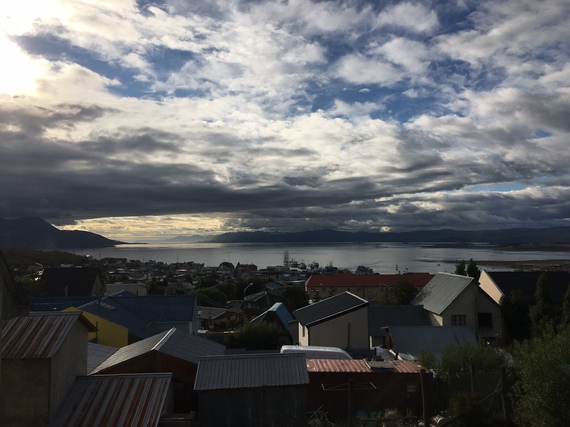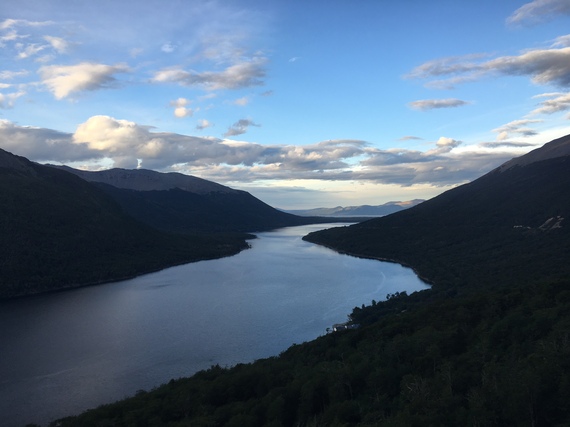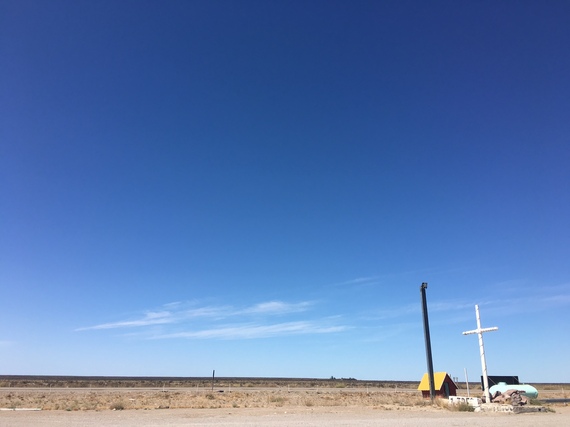Escape to Patagonia
This is frontier land. The enormous expanse of Patagonia, over a million square kilometers, has always held mystery. From huge dinosaur skeletons, giant sloths and colossal people to Chatwin's creatively licentious meanderings, its scale leads to intrigue as misty as some of the tales told are tall.
It is easy to get lost in it. The seemingly endless steppes and deserts, Andean mountains, and high volcanic plateaus provide plenty of refuge for those wishing to disappear. Many have pursued this as a purpose. To elude pursuit, seek reinvention or simply run away.
Butch Cassidy and the Sundance Kid briefly retired to 'lay low' at a ranch in Cholila in the foothills of the Andes - their 'South American Getaway' - before ultimately reverting to their life of crime. Senior Nazis were said to have fled to Bariloche following the Second World War. More colourful historians even suggest Hitler and Eva Braun lived out their days on a nearby estate until the early 1960s.
Not all were facing prosecution. Some were evading persecution like the Welsh nationalist exodus to Chubut that began in 1865. They established a 'little Wales beyond Wales' to preserve their culture and language from rapidly industrializing and anglicizing Britain.
Others sought the pioneer lifestyle, with millions of Spanish and Italian immigrants arriving into Argentina at the end of the nineteenth century. This aligned with dispiriting irony with the notorious 'Conquering of the desert' in Patagonia and the simultaneous dispossession of the indigenous Mapuche people. A narrative that is all too predictably painful and familiar.
But the idea of escape fascinates me. Indeed my own journey here is at least partly a compulsion for the clarifying effect of physical geographic distance from my work and of temporal displacement. I'm consciously disrupting my own space and time in order to seek out reflection, perspective and the magic of 'poesis'. Reconciling my thoughts to make creative sense of where we find ourselves as a people on this planet by travelling through what are still, to me at least, strange and wonderful places. This whole process is accentuated and thrown into stark, bright, icy, contrast by my arguably 'extreme' destination of Antarctica.
I am not attempting to cultivate artifice for this trip, generating meaning or justification. Instead I am endeavouring to discern the real importance of what is already here. Trying to decipher the messages embedded in the landscape, and held by the people who live within it. They speak to us with profundity if we only choose to listen.
Life is often about escape, at its most visceral the cruel displacement of refugees from war as in Syria, at its most venal our willingness to corrupt ourselves through alcohol or drugs in avoidance of a different grim reality of drudgery. I grind no moral axe in judgement here. We escape both tragic circumstance and our tragic lives and selves.
However fleeing violent destruction is one thing, thinking we can somehow run away from ourselves is quite another. How far do we need to go? How fast must we travel? Only to find that that which we run from is still and will always be with and within us?
One of my all time favourite travel quotes is Thomas Fuller's 'If an ass goes travelling, he'll not come home a horse'. We hope that a shift of context, circumstance or culture will change us, and are often dispirited or disappointed to find en route, on arrival or even on our return we are still 'us'.
The real question is what are 'we' running away from? Purposeless work that leaves us empty inside? Broken relationships? A culture of greed, self-promotion, self-interest and atomization? We are running not for our lives, but from our lifestyles. But unlike the unfortunates who risk theirs to get to our borders, we still have active, real and conscious choices to make.
My business partner Solitaire once said 'How depressing to live in a developed nation. Shouldn't we always be developing?' Implying progress is of course a perpetual thing if you're doing it right. Not something that stutters to a halt at some arbitrary point in time because change or reform threatens some temporary vested interests. Our work here is not yet done.
And my Ingles-Patagonico friend Nick, a resident of General Roca in the Linear Sur for the last decade, cited his sense of the end of radical change in Britain in contrast with the sense of new possibility and opportunity in Patagonia, as his main reason for 'never wanting to go back'.
This is really about mindsets. Whilst the sparsely populated potential of Patagonia might feel compelling in contrast to supposedly 'bursting at the seams'* Britain, Patagonia's impressive 'Lo atamos con alambre' (literally "fix it with a piece of wire") make do and mend mentality is currently a product of economic necessity not active choice. Equally Britain's apparent sense of deradicalised resignation feels like passive acceptance not a direction we chose.
The real test is whether Patagonia's elegant frugality can survive greater economic prosperity, where luxury is perhaps the destroyer of invention? Can a resourceful simplicity persevere? And whether Britain can shake itself out of its relatively cosy but crapulous reverie and realize we too can still do better?
Our times may seem tough, dark even. Especially when we empathically slip on the shoes of those impelled to try and join us as their own homes, communities and countries politically implode, or pyrotechnically explode. This makes escapism in the hedonistic, denialist, avoidance sense more tempting. If we turn away from our challenges, perhaps they will simply evaporate? But there is another way.
The philosopher Albert Camus wrote in 'Return to Tipasa' that "In the depths of winter, I finally learned that within me there lay an invincible summer." Rather than escaping from our problems to some mythical elsewhere we should be looking inside ourselves. Asking those most fundamental questions - Who am I? Who are we? Where are we? And when we do so the essence of our deepest answers may be revealing.
The season appears bleak, flight seems preferable to fight. But better to face our demons and decisions wide-eyed in the light than fumble in the darkness. Only in that cold reality can the full warmth of our collective potential emerge. And perhaps for the first time we'll be running towards our brighter future not away from our darker past.
*Not a view I share
Ed Gillespie is Co-Founder of www.wearefuterra.com, author of 'Only Planet - a flight-free adventure around the world' and off to the Antarctic...
Follow Ed Gillespie on Twitter: www.twitter.com/frucool and via #pole2soul
This blog is part of a series. Read other instalment's via the author's profile page.
Follow Ed Gillespie on Twitter: www.twitter.com/frucool


